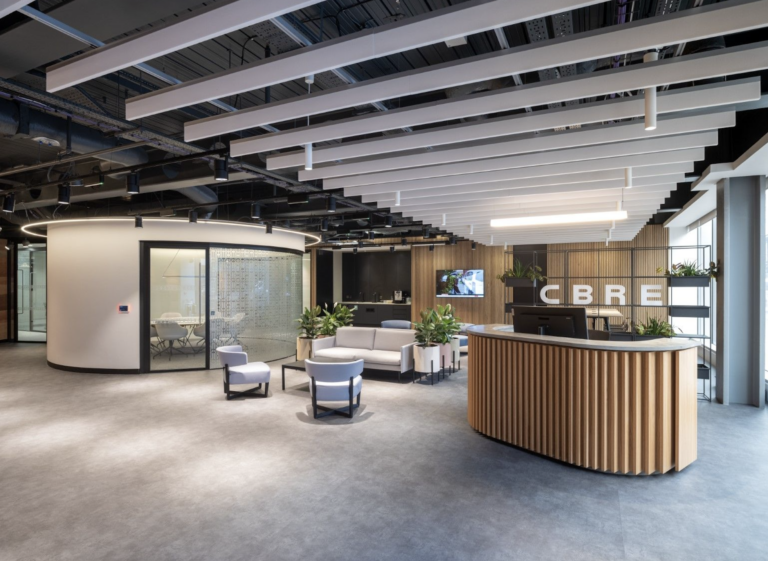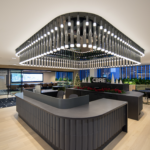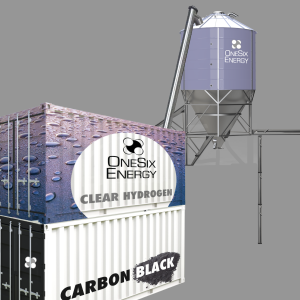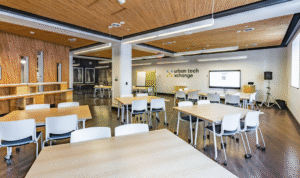
- Kim Kisner
- Business
- 03/25/2025
How Collaboration, Education, and AI are Shaping Sustainable Building Management

With roots tracing back to 1906, CBRE is a global real estate services firm specializing in property sales, leasing, financing, facilities and property management, valuations, investment management, and development across various industries. With a strong presence in Detroit and Southeast Michigan, the company plays a key role in shaping the region’s commercial real estate landscape.
SBN Detroit interviewed Tommy Bledsoe, Senior Sustainability Specialist at CBRE, about the company’s sustainability strategy, the hurdles in decarbonizing real estate, and the trends shaping the future of sustainable property management.

Q: How does CBRE approach sustainability?
A: CBRE’s goal is to create long-term value for the company and its clients by accelerating sustainability initiatives. This commitment extends across CBRE’s operations as well as the properties it manages and develops.
The company has set a net-zero greenhouse gas emissions target by 2040, covering corporate operations, real estate management and development, and supply chain activities. Since most of these emissions come from properties managed on behalf of clients, CBRE’s success depends on strong collaboration. To meet this challenge, CBRE has built end-to-end sustainability capabilities that help the company and its clients transition toward a lower-carbon future.
Since 2019, we’ve reduced absolute emissions by 18 percent across Scopes 1, 2, and 3.
Q: CBRE has set ambitious sustainability targets, but what are the biggest challenges in reducing emissions across managed properties and assets?
A: One of the biggest challenges is the need for partnerships with property owners. While CBRE plays a key role in managing properties, major sustainability investments and operational changes require approval from the building owners themselves.
To address this, CBRE takes a consultative approach, helping guide decision-making with data-driven recommendations that align financial benefits with sustainability outcomes. By demonstrating how sustainability investments enhance asset value and operational efficiency, the company works to gain buy-in from property owners and support long-term emissions reductions.
Q: With nearly 97 percent of CBRE’s total emissions coming from property management and development, what strategies are in place to address and decarbonize these areas?
A: Since 2019, CBRE has reduced emissions across property and facility management by focusing on four core areas:
- Maximizing resource efficiency through energy efficiency projects
- Expanding the adoption of renewable energy
- Reducing reliance on fossil fuels through electrification
- Decarbonizing the supply chain by working closely with vendors
CBRE has also strengthened its sustainability capabilities through strategic partnerships. The company has a global collaboration with Deepki, a leader in ESG data management, and has expanded its renewable energy expertise by acquiring NRG’s renewable business. Additionally, CBRE is investing in learning and development programs to ensure employees – especially those outside of sustainability roles – have the knowledge needed to effectively advise clients.
Q: Many companies struggle to balance sustainability goals with financial concerns. How does CBRE demonstrate the business case for sustainability to property owners and investors?
A: We discuss the financial benefits of sustainability with our clients frequently, and the data consistently shows that sustainability investments are good for business. Buildings that incorporate sustainability measures tend to generate higher operating income, with many commanding an increase in rental premiums of up to four percent in the office sector. Additionally, these properties operate more efficiently, leading to lower utility and maintenance costs.
Market demand is also increasing. A CBRE survey of office occupiers found that 66 percent of tenants prioritize sustainable building features, making it the most commonly cited amenity preference. Properties with strong sustainability credentials also tend to resell at higher values, making sustainability a key differentiator in long-term asset performance.

CBRE works closely with clients to provide data-driven insights and present projects that align both financial and environmental benefits.
Q: What industries or property types present the biggest challenges for sustainability initiatives, and how does CBRE tailor solutions to different clients?
A: The biggest challenge isn’t necessarily the type of property, but rather the lease structure. Industrial and retail properties, for example, often operate under triple-net leases, where tenants – not property owners – are responsible for utility costs. This creates a scenario where landlords may hesitate to invest in sustainability upgrades if tenants receive most of the financial benefits.
As a property manager, CBRE sits at the nexus between owners and tenants, putting the company in a unique position to bridge this gap. We work to align interests by educating tenants on green initiatives, offering sustainability services that collect and analyze utility data, and identifying mutually beneficial sustainability projects. By facilitating collaboration, CBRE helps landlords and tenants find common ground on sustainability investments.
Q: Speaking of collaboration, how does CBRE work with suppliers, contractors, and municipalities to ensure sustainable building practices?
A: CBRE’s sustainability efforts extend beyond property owners and occupiers to include suppliers, contractors, and industry organizations. The company is an active member of industry groups such as the U.S. Green Building Council and the Building Owners and Managers Association. Additionally, CBRE enforces a supplier code of conduct that ensures vendors align with socially and environmentally responsible commitments.
Q: Many older buildings were not designed with energy efficiency in mind. What strategies does CBRE use to retrofit and modernize legacy properties?
A: Retrofitting existing buildings is a major focus, particularly since an estimated 80 percent of today’s buildings will still be in use by 2050. Achieving a sustainable built environment requires upgrading these properties rather than relying on new construction alone.
We begin by assessing a building’s baseline performance, using software tools to analyze energy consumption and model potential retrofit pathways. Engineers conduct on-site evaluations to identify efficiency opportunities, and findings are compiled into asset-specific sustainability action plans.
Q CBRE operates globally. How do sustainability priorities and challenges differ across regions, specifically Southeast Michigan?
A: We see a lot of regional differences and nuances. Regulations vary by region, and in Southeast Michigan, local policies play a key role in driving sustainability efforts.
Both Detroit and Ann Arbor have energy and water benchmarking policies, requiring properties of a certain size to report consumption data. While benchmarking is common nationwide, some cities and states are beginning to introduce emissions reduction mandates as well.
Q: Beyond emissions reduction, where else is CBRE driving sustainability efforts?
A: CBRE provides a range of sustainability solutions beyond emissions reduction, including water conservation, circular economy initiatives, and climate risk assessment. The company has dedicated teams focused on helping clients develop water efficiency plans, minimize waste, and integrate sustainable procurement strategies.
Climate risk assessment has also become a growing focus area. Through partnerships with platforms like Deepki and Climate X, we help clients quantify climate-related financial risks, evaluate asset vulnerabilities, and develop strategies to future-proof their properties against environmental changes.
Q: What’s the next big opportunity in sustainable real estate? What emerging trends or policies will drive the industry forward?
A: Artificial intelligence is emerging as a transformative tool in sustainability, with applications in data capture, reporting automation, and real-time energy optimization. AI is already being used to connect disparate building systems, improving overall efficiency, and its role in sustainability is expected to expand significantly.
Climate risk modeling is also advancing, allowing for more precise quantification of financial risks associated with climate change. More clients are beginning to incorporate climate risk assessments into their due diligence when acquiring new properties.
On the regulatory front, more companies are facing requirements to disclose carbon emissions and climate impacts. With disclosure regulations gaining momentum, we anticipate that an increasing number of clients will prioritize transparent sustainability reporting.
Be sure to subscribe to our newsletter for regular updates on sustainable business practices in and around Detroit.
Kim Kisner
- All
- Business
- Community
- Education
- Events

Eastern Market Partnership, in collaboration with the City of Detroit’s Office of Sustainability Urban Agriculture Division, has announced $240,000 in grant funding to support Detroit-based farmers and farmer collectives. The grants will advance food access, climate education, sustainable land use, and economic opportunity, with priority given to Black- and Indigenous-led farms, youth-led initiatives, and projects rooted in historically disinvested neighborhoods. The recipients – ranging from cooperatives and community...

Citizen Robotics is a Detroit-based nonprofit that advances the use of robotics and digital manufacturing in residential construction, focusing on improving productivity, sustainability, and long-term affordability. Best known for its early work in 3D-printed housing, it explores how alternative construction methods and new financial models can reduce material waste, lower lifetime operating costs, and enhance the resilience of homes. SBN Detroit interviewed Tom Woodman, founder and president of...

Detroit-based OneSix Energy is a clean-energy technology company focused on advancing a lower-carbon approach to hydrogen production. Headquartered at Newlab in Detroit, the startup is developing a proprietary methane pyrolysis system designed to produce hydrogen without carbon dioxide emissions, while also generating solid carbon as a co-product. SBN Detroit interviewed with cofounder Stefan Sysko about the company’s origins, its approach to hydrogen production, and why Detroit is positioned...







